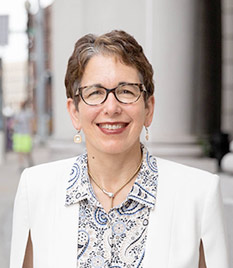As you know, experiential learning as a pedagogical focus for our work – inside the classroom and outside of it – is a central element of the Suffolk 2025 strategic plan. At the first Board of Trustees meetings of this academic year, we made sure that the Board understands that we are committed not to just talking about experiential learning, but in fact that we “walk the talk,” and will continue to do so even more. An orientation for new trustees, presentations to the Board during a dinner in Sargent Hall’s fifth-floor Commons, and a presentation to the full Board on a draft dashboard that will track experiential learning activities on campus, all focused substantially on this topic. There is so much great work happening on this front, and it was a pleasure to see some of that shared with the Board.
The Board conducted other important business during these meetings. Trustees approved the final FY19 audited financials, which will soon be posted online, listened to an in-depth presentation on the important work being done by the Center for Counseling Health and Wellness, and got a comprehensive update on the Institutional Master Plan that is currently making its way through the city’s approval process. The Board approved tuition, room, meal plan, and fee rates for next year, and new trustees looked at organizational charts for the various divisions of the University and viewed presentations on University governance and fiduciary duties, among other things.
All of that work is significant and necessary for the operation of the University. But the Board’s focus on the strategic plan and our core value proposition was in my view most critical of all. Experiential learning sits at the heart of our distinctive approach to education. The strategic plan calls for expanding that educational approach so that it is essentially ubiquitous and integrated throughout the curricular and co-curricular experience, and becomes synonymous with a Suffolk education. The University community of trustees, faculty, staff, and alumni must all be focused on our central goal of using experiential learning to ensure our students are ready for career success and community impact in the 21st century global world in which we live. We must be sure that we continue to expand on this work. We must “walk the talk” across all schools, programs, activities, and degree levels to ensure that every student benefits from the transformational power of our approach.

Marisa J. Kelly
President





Leave A Comment
I welcome two-way communication with the Suffolk Community. Faculty, staff, and students are encouraged to respond to posts, exchange ideas, share opinions, and offer feedback by logging in below using your regular Suffolk login (without "@suffolk.edu"). Comments should be made in accordance with standards of civil discourse, and we reserve the right to delete derogatory or inappropriate comments. log in